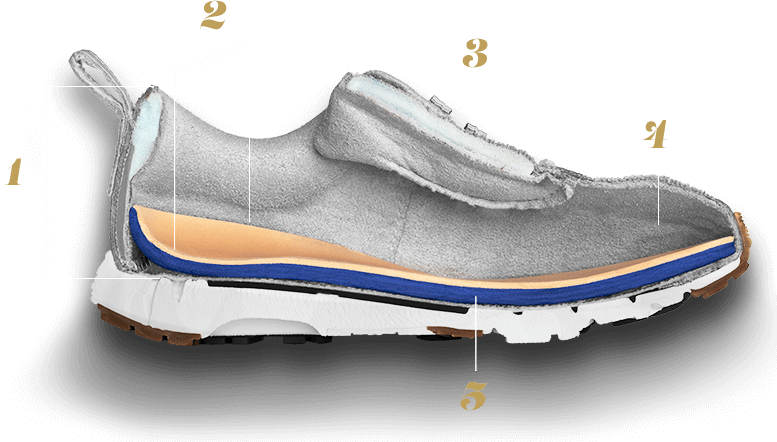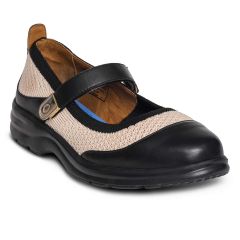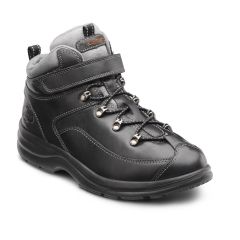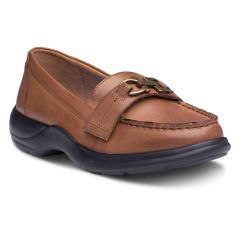Healthy feet begin with a proper fit.
Poorly fitting shoes can contribute to foot health issues especially for those struggling with the symptoms of diabetes. Conditions like neuropathy (foot numbness) can quickly turn small cuts, blisters, or sores caused by the improper fit of your shoes into bigger issues—and can even lead to amputation.


- Extra depth options
- Extra wide widths
- Easy on/off closures
- Large toe box
- Custom orthotics available
Built with you in mind
Straight out of the box, Dr. Comfort® offers a number of design features and technologies to help those struggling with foot health get the comfort they need. To experience the full range of benefits the Dr. Comfort brand offers, we recommend you visit a podiatrist. They will work directly with us to customize your footwear to the unique shape of your foot and the conditions you may struggle with.
 Medicare can help
Medicare can help
You may be eligible to have Medicare help cover the cost of your Dr. Comfort® footwear. Medicare and supplemental insurance may reimburse part or all of the cost of Dr. Comfort shoes and prescription inserts for diabetics who meet a certain criteria. A qualified health professional can determine if you are eligible.
Coverage is for anyone with Medicare Part B (or other qualified insurance) who has diabetes, has appropriate documentation from a qualified physician, and:
- Previous amputation of the foot, or part of either foot
- History of ulcers
- History of pre-ulcerative calluses
- Diabetic neuropathy with evidence of callus formation
- Foot deformity
- Poor blood circulation
Consult a qualified expert or Medicare program representative for more details.
Featured Products
-
View Details


Grace
Women’s Walking ShoeSpecial Price $74.99 Regular Price $165.00 As low as:55% Off Save $90.01Rating:73%(21) Reviews>A cross-functional walking shoe that provides style and comfort and stability for any adventure. -
View Details


Jack
Men’s Athletic ShoeSpecial Price $123.75 Regular Price $165.0025% Off Save $41.25Rating:86%(7) Reviews>Footwear that helps prevent foot complications while delivering a hint of athletic style. -
View Details


Jackie
Women’s Dress ShoeSpecial Price $123.75 Regular Price $165.0025% Off Save $41.25Rating:100%(4) Reviews>Mary Jane dress shoe designed for easy donning and doffing. -
View Details

Sean
Men’s - Athletic Wool ShoeSpecial Price $49.50 Regular Price $165.0070% Off Save $115.50Rating:100%(1) Review>Stylish comfort and breathability with a fashionable wool look
-
View Details


Vigor
Women’s Work/Hiking BootSpecial Price $123.75 Regular Price $165.0025% Off Save $41.25Rating:87%(18) Reviews>A leather hiking boot that’s casual and stylish for work, and rugged enough for outdoor adventures. -
View Details


Roger
Men’s Casual ShoeSpecial Price $123.75 Regular Price $165.0025% Off Save $41.25Rating:63%(7) Reviews>A relaxed, casual shoe that delivers an athletic-inspired feel. -
View Details


Mallory
Women’s DressSpecial Price $123.75 Regular Price $165.0025% Off Save $41.25Rating:69%(9) Reviews>A modern-day leather slip-on dress shoe with micro-suede lining. -
View Details

Relax
Men’s SlipperSpecial Price $57.74 Regular Price $76.9925% Off Save $19.25Rating:87%(11) Reviews>Relaxing slipper with a closed-heel design ideal for lounging or walking around the house.
*Todd WF, Armstrong DG, Liswood PJ. Evaluation and treatment of the infected foot in a community teaching hospital. J Am Podiatr Med Assoc. 1996;86(9):421 426. [PubMed] [Google Scholar]















